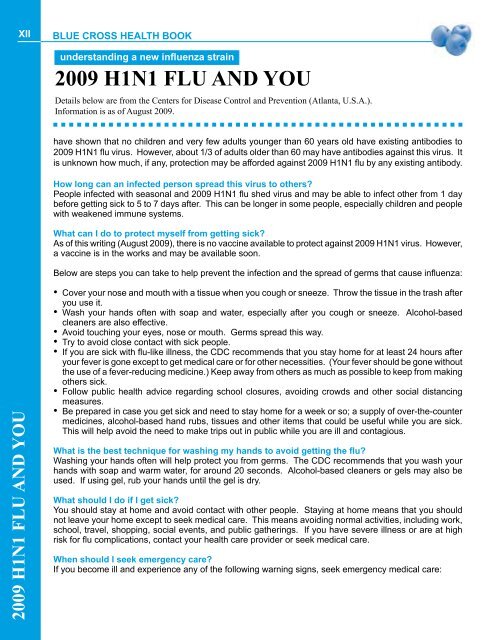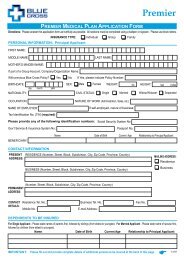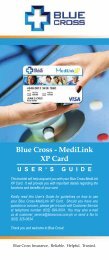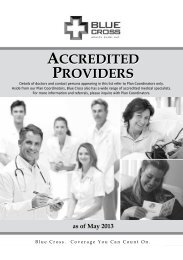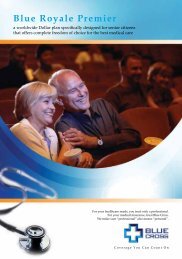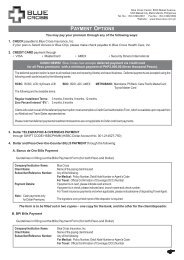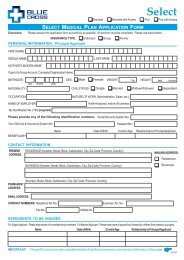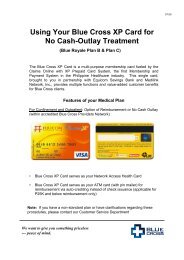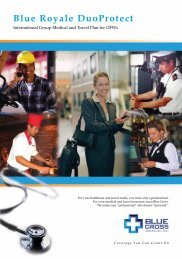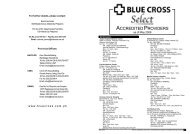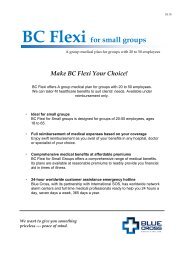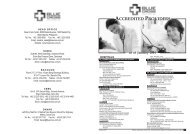Health Book_03-Special Features_2011_web.pdf - Blue Cross
Health Book_03-Special Features_2011_web.pdf - Blue Cross
Health Book_03-Special Features_2011_web.pdf - Blue Cross
You also want an ePaper? Increase the reach of your titles
YUMPU automatically turns print PDFs into web optimized ePapers that Google loves.
XII<strong>Blue</strong> cross <strong>Health</strong> BOOKunderstanding a new influenza strain2009 H1N1 FLU AND YOUDetails below are from the Centers for Disease Control and Prevention (Atlanta, U.S.A.).Information is as of August 2009.have shown that no children and very few adults younger than 60 years old have existing antibodies to2009 H1N1 flu virus. However, about 1/3 of adults older than 60 may have antibodies against this virus. Itis unknown how much, if any, protection may be afforded against 2009 H1N1 flu by any existing antibody.How long can an infected person spread this virus to others?People infected with seasonal and 2009 H1N1 flu shed virus and may be able to infect other from 1 daybefore getting sick to 5 to 7 days after. This can be longer in some people, especially children and peoplewith weakened immune systems.What can I do to protect myself from getting sick?As of this writing (August 2009), there is no vaccine available to protect against 2009 H1N1 virus. However,a vaccine is in the works and may be available soon.Below are steps you can take to help prevent the infection and the spread of germs that cause influenza:2009 H1N1 FLU AND YOU• Cover your nose and mouth with a tissue when you cough or sneeze. Throw the tissue in the trash afteryou use it.• Wash your hands often with soap and water, especially after you cough or sneeze. Alcohol-basedcleaners are also effective.• Avoid touching your eyes, nose or mouth. Germs spread this way.• Try to avoid close contact with sick people.• If you are sick with flu-like illness, the CDC recommends that you stay home for at least 24 hours afteryour fever is gone except to get medical care or for other necessities. (Your fever should be gone withoutthe use of a fever-reducing medicine.) Keep away from others as much as possible to keep from makingothers sick.• Follow public health advice regarding school closures, avoiding crowds and other social distancingmeasures.• Be prepared in case you get sick and need to stay home for a week or so; a supply of over-the-countermedicines, alcohol-based hand rubs, tissues and other items that could be useful while you are sick.This will help avoid the need to make trips out in public while you are ill and contagious.What is the best technique for washing my hands to avoid getting the flu?Washing your hands often will help protect you from germs. The CDC recommends that you wash yourhands with soap and warm water, for around 20 seconds. Alcohol-based cleaners or gels may also beused. If using gel, rub your hands until the gel is dry.What should I do if I get sick?You should stay at home and avoid contact with other people. Staying at home means that you shouldnot leave your home except to seek medical care. This means avoiding normal activities, including work,school, travel, shopping, social events, and public gatherings. If you have severe illness or are at highrisk for flu complications, contact your health care provider or seek medical care.When should I seek emergency care?If you become ill and experience any of the following warning signs, seek emergency medical care:


